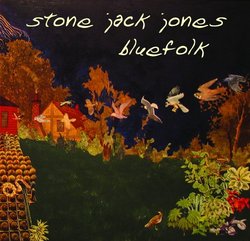| All Artists: Stone Jack Jones Title: Bluefolk Members Wishing: 1 Total Copies: 0 Label: Fictitious Records Original Release Date: 1/1/2006 Re-Release Date: 2/21/2006 Genres: Country, Folk, Pop, Rock Styles: Americana, Contemporary Folk, Adult Alternative, Folk Rock Number of Discs: 1 SwapaCD Credits: 1 UPC: 628740777923 |
Search - Stone Jack Jones :: Bluefolk
 | Stone Jack Jones Bluefolk Genres: Country, Folk, Pop, Rock
|
Larger Image |
CD Details |
CD ReviewsPitchfork Review 7.9!!! Michael T. Davis | 03/14/2006 (5 out of 5 stars) "As his name might imply, Stone Jack Jones hails from a coal-mining family out of West Virginia; if he had gone down that shaft instead of picking up a guitar, he'd have been a fifth-generation miner. This biographical nugget sounds like press-release fodder, but it becomes more significant when you hear the first couple of songs on his second album, bluefolk: Opener "Smile" and the menacing "Bread" are pitch-dark and subterranean, with rough melodies pickaxed from rock and cacophonous instruments that coalesce into mine-rail beats. "Danger lurks like a breaking limb," he warns on "Vivid"; death isn't just ever present, but a driving force.
Lyrically, Jones finds inspiration in Biblical foreboding, keeping one foot in Genesis and the other in the Book of Revelation, caught between original sin and the end of the world. "Can you hear the horses galloping on?" he asks repeatedly on "Hey Love". On "Bread"-- ostensibly an antiwar song based on Jones' own thwarted draft during the Vietnam War-- he carries on a conversation with a frantic Abraham, who's searching for his lost son, "the almost-murdered one." Instead of sounding obvious or outrageous, the exchange sounds perfectly apt within Jones' apocalyptic mountain music. But it's the music on bluefolk and Jones' vocal performance that gives these songs their simultaneously claustrophobic and mesmeric power. The rumble of instruments that begins "Smile" sets the tone, and the martial programmed beat on "Bread" pushes the other instruments militaristically as Patty Griffin's backing vocals offset Jones' gruffer voice. On "Vivid" he runs his words together until they lose their mean and become pure sound: "vividis vividisvividdoes." The motion of those syllables becomes curiously unsettling. On an album like bluefolk, where everything sounds submerged in shadows, light is only a relative term, but the songs' progress is a kind of resurfacing, with Jones climbing out of his dark pit and back onto the surface of the earth. The songs grow less and less opaque as he makes naked declarations of conflicted love, as on "Evermore": "I miss you I want you I lay you beside you I reach for you dubiously." The wall of sound that confined earlier songs crumbles as the lyrics and instruments separate, the tempos slacken, and the melodies soften, culminating with the spare and strangely moving "Freedom", constructed around a clip from a Martin Luther King Jr. speech. In other hands, this type of finale might have been fatally transparent, drawing a too-straight line from 60s revolution to 90s complacency. But Jones wisely keeps his intentions mysterious and personal, which prevents the album's second half from being a letdown after the more intense first half. Continuing in the vein of those early songs would have produced a smothering album, so Jones lets a little light in, if only to show how dark the world can be. -Stephen M. Deusner, March 3, 2006 " |

 Track Listings (11) - Disc #1
Track Listings (11) - Disc #1